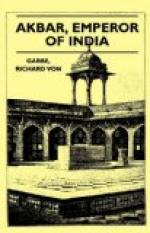The misty myth-woven veil which hangs over persons and events of earlier times, vanishes at the beginning of the modern era which in India starts with the Mohammedan conquest, for henceforth the history of India is written by foreigners. Now we meet with men who take a decisive part in the fate of India, and they appear as sharply outlined, even though generally unpleasing, personalities.
Islam has justly been characterized as the caricature of a religion. Fanaticism and fatalism are two conspicuously irreligious emotions, and it is exactly these two emotions, which Islam understands how to arouse in savage peoples, to which it owes the part it has played in the history of the world, and the almost unprecedented success of its diffusion in Asia, Africa and Europe.
About 1000 A.D. India was invaded by the Sultan Mahmud of Ghasna. “With Mahmud’s expedition into India begins one of the most horrible periods of the history of Hindustan. One monarch dethrones another, no dynasty continues in power, every accession to the throne is accompanied by the murder of kinsmen, plundering of cities, devastation of the lowlands and the slaughter of thousands of men, women and children of the predecessor’s adherents; for five centuries northwest and northern India literally reeked with the blood of multitudes."[1] Mohammedan dynasties of Afghan, Turkish and Mongolian origin follow that of Ghasna. This entire period is filled with an almost boundless series of battles, intrigues, imbroglios and political revolutions; nearly all events had the one characteristic in common, that they took place amid murder, pillage and fire.
[Footnote 1: E. Schlagintweit, Indien in Wort und Bild, II, 26 f.]
[Illustration: Akbar, emperor of
India.
From Noer’s Kaiser Akbar,
(Frontispiece to Vol. II).]
The most frightful spectacle throughout these reeking centuries is the terrible Mongolian prince Timur, a successor of Genghis-Khan, who fell upon India with his band of assassins in the year 1398 and before his entry into Delhi the capital, in which he was proclaimed Emperor of India, caused the hundred thousand prisoners whom he had captured in his previous battles in the Punjab, to be slaughtered in one single day, because it was too inconvenient to drag them around with him. So says Timur himself with shameless frankness in his account of the expedition, and he further relates that after his entry into Delhi, all three districts of the city were plundered “according to the will of God."[2] In 1526 Baber, a descendant of Timur, made his entry into Delhi and there founded the dominion of the Grand Moguls (i.e., of the great Mongols). The overthrow of this dynasty was brought about by the disastrous reign of Baber’s successor Aurungzeb, a cruel, crafty and treacherous despot, who following the example of his ancestor Timur, spread terror and alarm around him in the second half of the seventeenth and the beginning of the eighteenth centuries. Even to-day Hindus may be seen to tremble when they meet the sinister fanatical glance of a Mohammedan.




